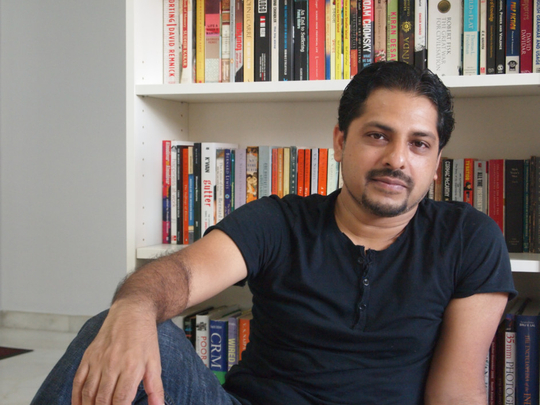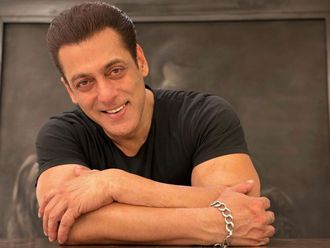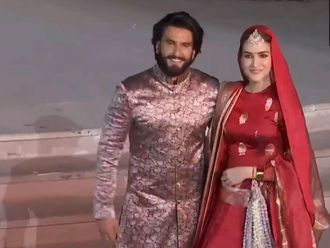
Iqbal-The Life of a Poet, Philosopher and Politician
By Zafar Anjum, Random House India, 274 pages, Rs499
Zafar Anjum wears many hats. This Singapore based journalist has written for several noted publications including “The South China Morning Post” (Hong Kong), “The Hindustan Times” (India), “The Times of India” and “Tehelka” (India).
His book “The Resurgence of Satyam” (2012) traced the saga of the IT Company, Satyam Computers and became a best-selling business book in 2014.
As founder and editor of “Kitaab” an online journal and a publishing company, Anjum promotes Asian writing in English. Not to forget that this member of the Screenwriters Association (Singapore) has to his credit short films, documentaries and two feature films too.
In an interview, Anjum talks about his new book, “Iqbal-The Life of a Poet, Philosopher and Politician.”
In the prologue you have talked about your school tutor, Mahboob Alam Saheb, who introduced you to Iqbal’s poetry and on your Aligarh University days, yet, what was the deciding moment for the book?
Two years ago when I read Pankaj Mishra’s book, “From The Ruins Of The Empire,” I saw that he had treated Iqbal on par with Tagore in playing a seminal role in the anti-colonial movement of Asia. That gave me the impetus to write a biography of this neglected poet-philosopher.
What were the road blocks in your research for the book?
One, I did not have access to a lot of research material because of my location in Singapore. Though Singapore’s libraries are rich in English language materials, they don’t have much literature available on Urdu or Hindi writers. I had to order some books to get me going for my research. Luckily, I was not writing a historical text or a scholarly tome. There are numerous scholars who have done their PhDs on Iqbal in India, Pakistan and elsewhere. Hundreds of books have been written on various aspects of Iqbal’s life, and his literary, philosophical and political contributions. My aim was to narrate Iqbal’s life like a novel so that the common man, who might be curious about the poet who wrote “Saare Jahan Se Accha Hindustan Hamara”, gets a glimpse into Iqbal’s life.
Two, I did not have enough funds to travel and do first hand research that is required for a project like Iqbal. I didn’t even know where to turn to for such help. The other issue was time. I had exactly one year to deliver the book. I have a full-time job. On top of that I was working on another book simultaneously. It was a bad decision but I had made a promise so I had to keep it. Because of these two projects running concurrently 2013-2014 turned out to be the busiest years of my life. I wish I had four-five years to devote to Iqbal!
Is there any unforgettable moment during this phase of being associated with Iqbal so closely?
Probably there might have been some interesting anecdotes to share had I had travelled widely in connection with this book. But I distinctly remember feeling elated when my sights fell on the entrance of Trinity College in Cambridge. I imagined Iqbal walking around the corridors of this great institution more than a hundred years ago.
I discovered and learnt a lot about Iqbal while working on this book. Sometimes I would be so lost in thinking about his life and times that I would get disconnected with my immediate surroundings. There were times when I wouldn’t respond to my wife and my daughter would tease me by saying, “Daddy is with his friend, Iqbal.”
Did you not plan on visiting Pakistan for first-hand information?
The idea was not to write a historical text on Iqbal. A lot of research has already taken place on Iqbal especially in Pakistan. For the kind of narrative that I wanted to weave, I had more than enough material to work from. In fact, I had to keep a lot of details out of the book so as not to make it too heavy and academic a read.
A visit to Sailkot and Lahore would have enriched the narrative but unfortunately I could not undertake the journey because of shortage of time and funds. Terror incidents taking place at that time in Pakistan also prevented me from travelling to Pakistan.
How relevant is Iqbal for today’s generation?
Iqbal is a shared heritage of South Asia, in fact, for the whole of mankind. He was a universal poet and he speaks to all of us. Iqbal’s message is the message of inquiry and action. He is one of the most inspiring poets in any language. For South Asians, he is a great example of the Indo-Asiatic culture as a personality.
Iqbal is especially relevant to the Muslim youth today. He dreamt of a second Islamic renaissance, a synthesis of the best elements of the East and the West, and that is yet to happen. Iqbal will speak to the despairing Muslim youth today who feel under attack because of terrorism and civil war in many parts of the Muslim world. In Iqbal’s poetry and philosophy, there is no room for despair, only for hope and action to change a people’s destiny.
What is next?
My second book, which chronicles ten of the world’s most innovative hotspots, has just gone to press. It should come out by late December or early next year. I have also been working on a novel for many years now and recently I went to Arvon (UK Foundation that promotes creative writing) to work on it. I want to take a final stab at it next year. Meanwhile, I’ve been working on some scripts and I plan to make a few shorts and a feature film in the next two years..
Can you elaborate on the innovative hotspots?
As the Internet has matured in technology and reach, we have seen an explosion in tech startups all over the world. Not only some of these startups are changing the world and how we live in it, they are also proving to be the engines of job creation—a role that will be even more critical in the future. To support these startups, new ecosystems are popping up all over the globe to help grow these companies, aided by governments, successful entrepreneurs and venture capitalists. My new book, “Startup Capitals” analyses the world’s top 10 startup capitals of the world and gives you a ringside view of what makes those ecosystems the engines of innovation and what can be learnt from their journey of evolution.
Fact file
“Iqbal-The Life of a Poet, Philosopher And Politician” written by Zafar Anjum
For most Indians, their first introduction to poet Mohammad Iqbal was through his song, “Saare Jahan Se Accha Hindustan Hamara.” One of the most enduring patriotic songs, it touches your heart right there.
But beyond that one song, how many of us know the man Iqbal? What was his life like? What about his family? What about his other writings?
What made this man, who used Sanskrit vocabulary and references from Hindu mythology in his poetry, who called India the land of Chishti and Nanak and Lord Ram ‘Imam-e-Hind and one who celebrated India’s multi-culturalism, to advocate the creation of a separate nation for Muslims?
How did his Persian poetry affect the people of Iran and Afghanistan? And, did you know that Iqbal at the insistence of his family married Kareem Bi, the daughter of Dr Atta Mohammad, a wealthy surgeon at the age of sixteen. Kareem Bi was older to him by three years.
Zafar Anjum takes readers on a journey of understanding Iqbal. Iqbal was born in Sialkot on November 9, 1877 to Noor Mohammad, (a tailor and embroiderer) and Imam Bi. He was their fourth child. Noor Mohammad’s ancestors were Kashmiri Brahmins who had migrated from Kashmir to Sialkot.
When Iqbal was two years old, he suffered a health ailment and his mother followed the traditional treatment of using leeches to suck out the infected blood. Unfortunately a pair of leeches was placed close to Iqbal’s right eye and though the child was cured his vision suffered irreparable damage in the later years of his life.
At six Iqbal was sent to a local mosque to study the Quran and later admitted into Syed Mir Hasan’s ‘Madrastaul Uloom.’ Hasan impressed with little Iqbal’s brilliance persuaded Noor Mohammad to send him to the local Scotch Mission School to receive a modern education.
When Iqbal’s father’s business takes a beating, he and his elder brother Atta Mohammad discontinue studies to work in a papier mache factory. The family situation improves with Atta Mohammad taking a job in the British Army and once Noor Mohammad’s business is better, Iqbal returns to school.
Iqbal grew up much influenced by his father’s spiritual leanings and his mystical experiences. Noor Mohammad insisted that his children read the Quran every day, a dedicated practice which he continued through Iqbal’s life.
Teenage years brought out the poet in Iqbal. At 16 he married Kareem Bi succumbing to family pressure. Moving to Lahore to do BA at the prestigious Government College, Iqbal’s poetry made him popular there. “Himala”, a tribute to the Himalayas marked the beginning of the patriotic phase of Iqbal’s poetry.
During 1905-1908, while studying philosophy in London and Germany, Iqbal is disillusioned by the racist and materialistic culture of the western world. Seeking refuge in his religion Iqbal is convinced that Islam, which concealed the principle of true individualism and humility, would come to humanity’s rescue.
Anjum’s narrative in lucid prose is engaging without becoming a boring history book. It gets interesting after Iqbal’s return from Europe to Lahore. Iqbal while practicing law also gets vociferous with his two-nation theory.
One of his famous poems, “Shikwa”, on the plight of Muslims world over was penned in 1912. The ulemas disapproved of this poem for being disrespectful. While Iqbal spoke of Muslim brotherhood and solidarity, he did not talk about world domination by Muslims.
At the Allahabad address of 1930, one of the statements he made was: “I entertain the highest respect for the customs, laws and religious institutions of other communities. Nay, it is my duty, according to the Quran, even to defend their places of worship if need be.”
On the personal front, Iqbal unhappy with his marriage unburdened his heart to Atiya Begum, a modern Muslim woman, whom he befriended in London. Emma Wegenast, his German tutor was another woman with whom Iqbal shared a close bond that continued even after his return to India through letters.
Not many know that Iqbal did not have funds to buy a piece of land to build a house, but thanks to his second wife, Sardar Begum’s foresightedness, the family eventually had a house of its own.
Most poignant is the moment when the narrative draws to a close with Iqbal’s demise in 1938. His 13-year-old son, Javed puts on a brave front for his younger sister, Munirah’s sake. It leaves you misty eyed.
Connecting readers with Iqbal are photographs sourced from Iqbal Academy in Lahore.
Every chapter begins with a beautiful Iqbal quote. And the four appendices are valuable. With his epilogue, Anjum raises valid questions in today’s global situation to reflect on. The book is clearly not the ultimate story on Iqbal, but it definitely eggs readers to discover the man behind, “Saare Jahan Se Accha”.









